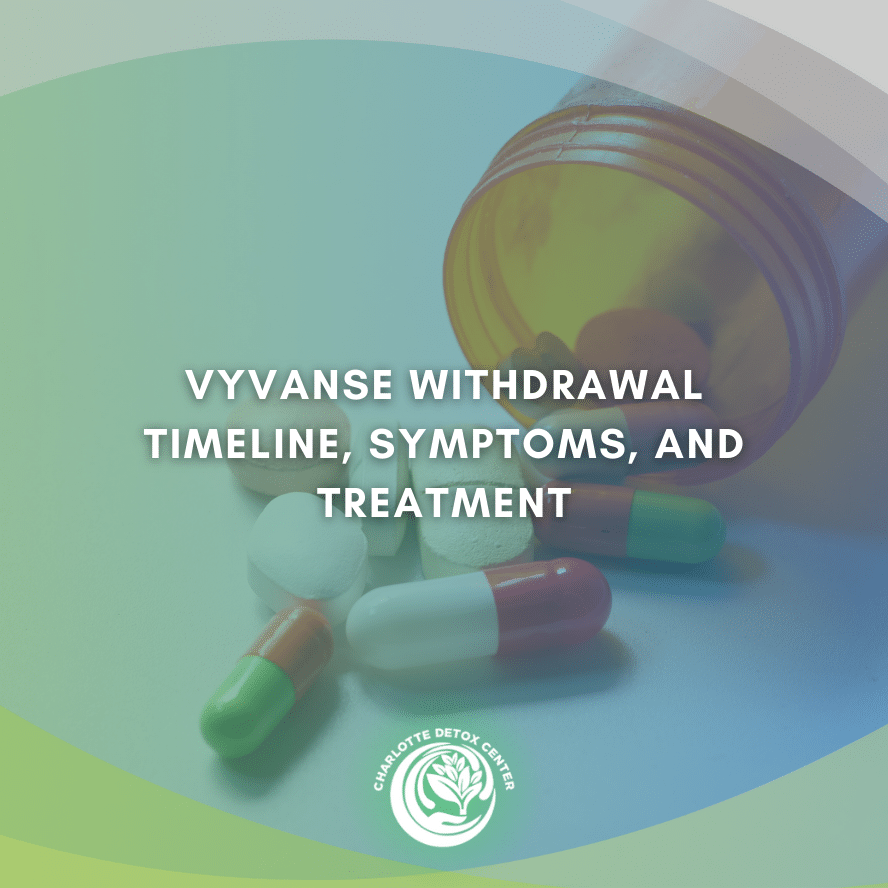Vyvanse Withdrawal Timeline, Symptoms, and Treatment

Medically Verified: 2/1/24
Medical Reviewer
Chief Editor

All of the information on this page has been reviewed and verified by a certified addiction professional.
Vyvanse is the name brand for a prescription stimulant drug known as lisdexamfetamine. This medication is primarily used to treat attention-deficit hyperactivity disorder (ADHD) and binge eating disorder.[1] While Vyvanse can be effective in managing these conditions, it is known to be habit-forming and addictive when abused.
If someone were to take Vyvanse without a prescription or in a larger dose than prescribed, they might experience an energetic and euphoric high. Oftentimes, young adults abuse this drug to gain better focus and more energy when studying for college exams. Whether you are misusing Vyvanse to study or simply for the effects, you could develop an addiction.
Once you are addicted to Vyvanse, your brain and body grow accustomed to the presence of the substance. As a result, suddenly stopping the use of it will cause withdrawal symptoms. Withdrawal may include symptoms like insomnia, anxiety, cravings, and more, and may begin a day after your last dose and last for two weeks or more.
While Vyvanse withdrawal is not life-threatening, it can be incredibly difficult to cope with, making it vital that you seek help from a medical detox center.
What are the Symptoms of Vyvanse Withdrawal?
Vyvanse is a central nervous system (CNS) stimulant, which means it increases activity in your brain. When you take Vyvanse regularly for an extended period, your body adjusts to its presence, leading to changes in brain chemistry and function. Over time, the body becomes reliant on the drug to maintain a certain level of neurotransmitter activity. If you suddenly stop taking Vyvanse, you may experience withdrawal symptoms.
The common symptoms of Vyvanse withdrawal include:[2]
- Changes in appetite
- Insomnia
- Extreme fatigue
- Depression
- Cravings for Vyvanse
- Issues concentrating
- Headaches
- Irritability
- Increased sweating
- Anhedonia (an inability to feel pleasure)
- Heightened anxiety
- Mood swings
- Shakiness
- Nightmares
- Body aches
Even though Vyvanse withdrawal is not life-threatening, it requires professional detox treatment. Many people who attempt to overcome withdrawal on their own end up relapsing, which can put you at risk of experiencing an overdose.
The Vyvanse Withdrawal Timeline
If you or a loved one are addicted to Vyvanse, being aware of the withdrawal timeline might convince you to seek professional help. Unfortunately, Vyvanse withdrawal can last up to 2 weeks or more, making it vital that you receive treatment from a detox program.
While the length of Vyvanse withdrawal can vary from person to person, individuals usually follow this general timeline:
1 to 2 Days
The half-life of Vyvanse is about 12 hours, which means it will not fully leave your system for up to 2 days.[1] With that being said, the initial symptoms of withdrawal will begin sometime between 1 to 2 days after your last dose of Vyvanse.
The initial symptoms of Vyvanse withdrawal may be mild, including symptoms like irritability, poor concentration, cravings, anxiety, and insomnia.
5 to 7 Days
Sometime between 5 to 7 days after your last dose, your withdrawal symptoms will peak. In other words, the symptoms you experience will be at their most severe. Peak Vyvanse withdrawal symptoms may include severe depression, anxiety, restlessness, extreme fatigue, insomnia, nightmares, and intense cravings for the drug.
It is important to be within the safety and comfort of a medical detox program at this time, as they can offer you medications to lessen your symptoms and increase your chances of long-term sobriety.
2 Weeks or More
After about 2 weeks, your symptoms should begin to subside. However, it is possible to develop a condition called post-acute withdrawal syndrome (PAWS), which is characterized by experiencing prolonged psychological symptoms of withdrawal. Thankfully, medical detox programs can prescribe medications to control these symptoms for as long as they persist.
How is Vyvanse Withdrawal Treated?
Vyvanse withdrawal should always be treated under the supervision of a medical detox program. These programs will use a combination of medical treatment and medications to limit withdrawal symptoms and ensure your safety.
While other substances like alcohol and opioids have specific medications intended to treat withdrawal symptoms, amphetamines like Vyvanse do not have these drugs.[2] Instead, you will be given a round of medications that treat the specific symptoms you are experiencing. For example, if you are dealing with depression, anxiety, and insomnia, you will be prescribed an antidepressant that also improves symptoms of sleeplessness.
In addition to medications, you will be monitored on a 24/7 basis to ensure you remain medically stable. This may involve constantly checking your vital signs and asking you questions about the symptoms you are experiencing. Additionally, you will have 24-hour access to mental health professionals in case you need extra support.
Once you overcome your withdrawal symptoms, your therapist will help you create a treatment plan. Usually, people transition into either inpatient or outpatient treatment as soon as they complete detox.
Find Help for Vyvanse Abuse and Addiction
If you or a loved one struggles with Vyvanse addiction, it’s time to seek help. Attempting to cope with Vyvanse withdrawal on your own can result in relapses and overdoses, making it vital that you seek assistance from a detox facility.
At Charlotte Detox Center, we can provide you with the treatments, medication, and support you need to overcome Vyvanse withdrawal. Contact us for more information on our medical detox program.
References:
- The Food and Drug Administration (FDA): Vyvanse Label, Retrieved January 2024 From https://www.accessdata.fda.gov/drugsatfda_docs/label/2007/021977lbl.pdf
- The National Library of Medicine (NLM): Treatment for Amphetamine Withdrawal, Retrieved January 2024 From https://www.ncbi.nlm.nih.gov/pmc/articles/PMC7138250/
